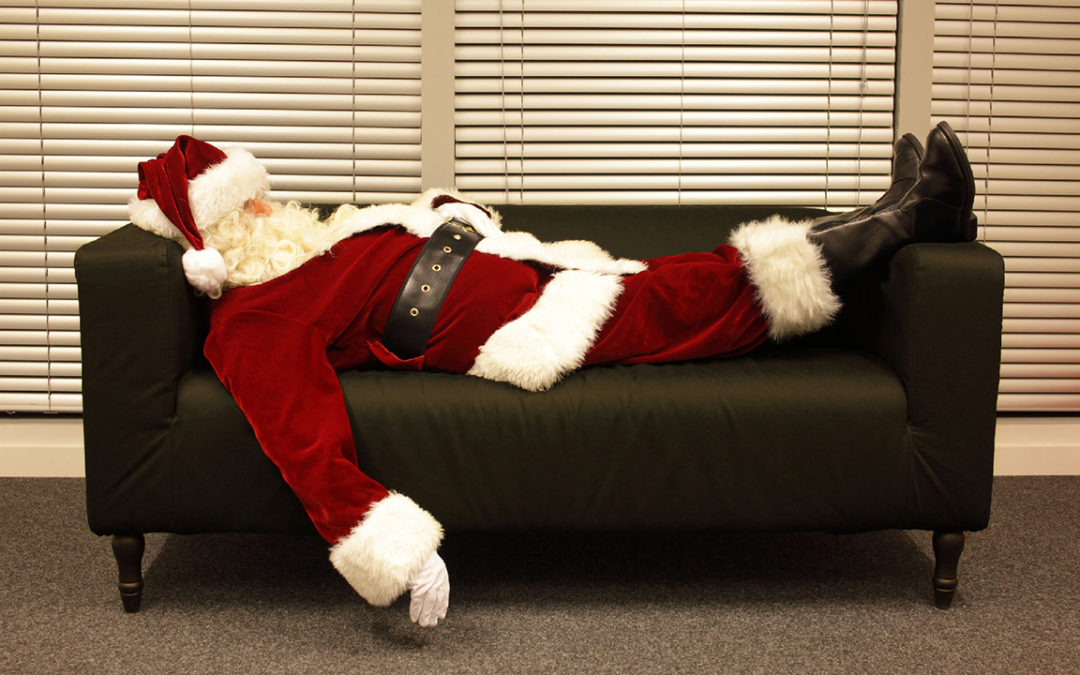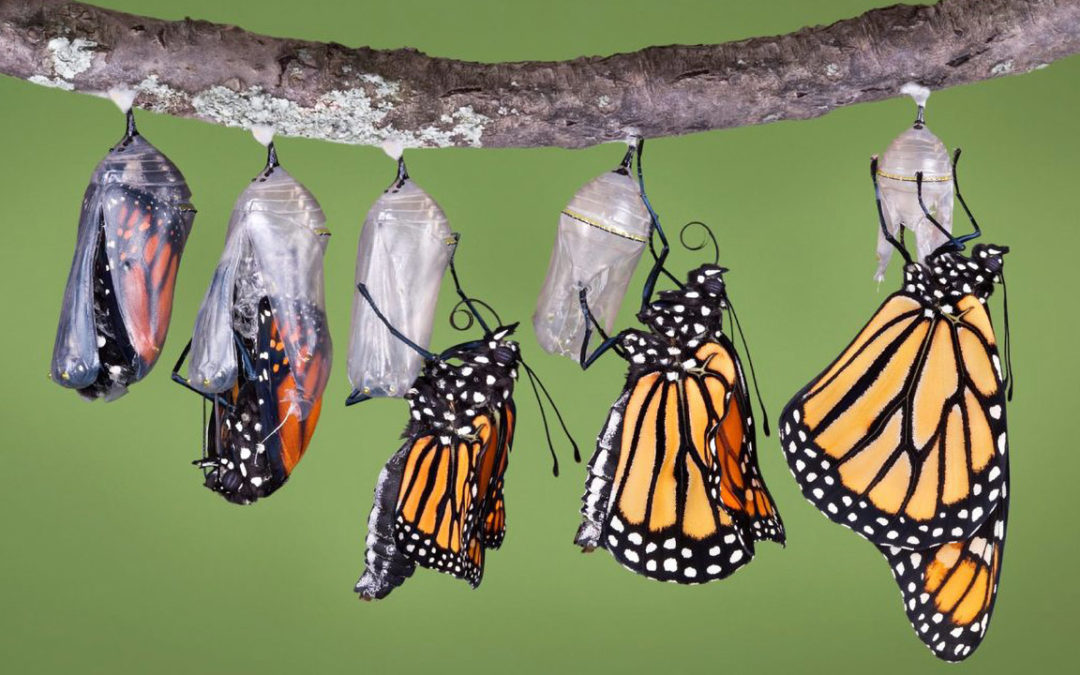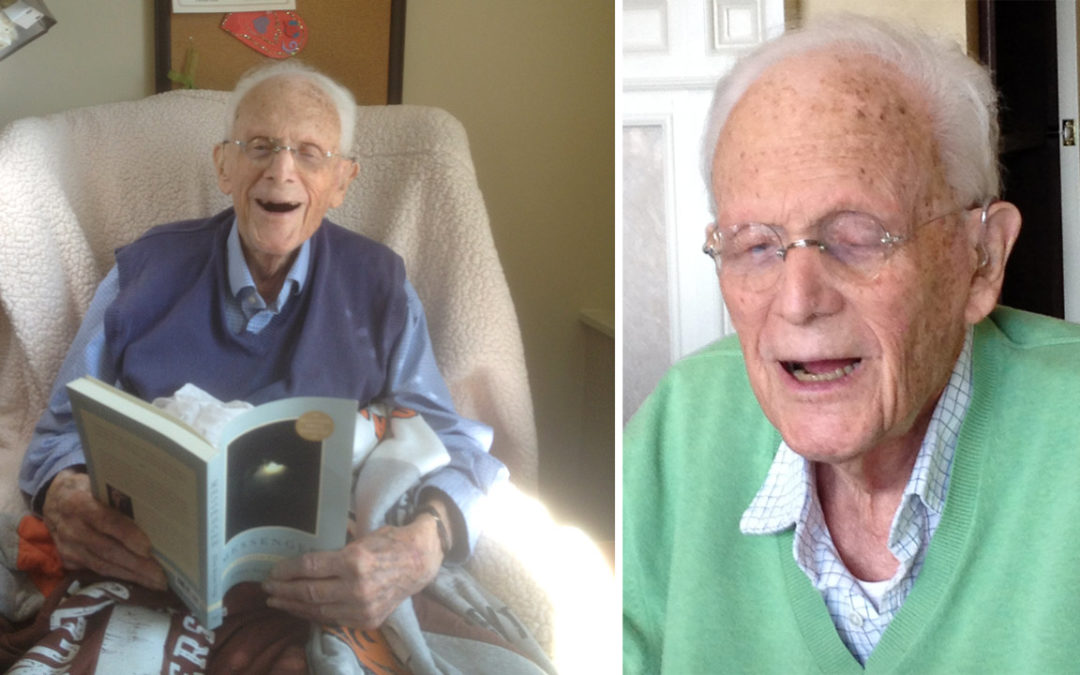
by Robert Bowie, Jr. | Dec 22, 2020 | Personal, Poetry
A child’s memory of Christmas viewed through a grandfather’s eyes
Like a massive multicolored parachute
His boxers have collapsed upon the floor
Slightly south of a wrinkled Santa Suit
That was left just outside the bathroom door.
A bunch of imagined elves in repose,
Smoke’n cigarettes, feet on the table,
Hang’n out and laugh’n ’bout Rudolf ‘s nose
Are love’n life as only elves are able.
Another Christmas, is at long last, past
As the fat man shampoos in the shower
And thinks of golf and summer thoughts at last.
Who’s this metaphor for redemptive power?
An old fat guy driving a sled with gifts?
A father at midnight is what it is.

by Robert Bowie, Jr. | Dec 8, 2020 | Featured, Personal
What is the matter with me? Is this pandemic changing my DNA?
What could be worse is that I am afraid that my house has become a COVID Cocoon but I sure as hell don’t feel like a butterfly in the making.
The only thing that might be worse is when you can’t get a song out of your head or… you start your own song and it rhymes and you can’t stop thinking you are… becoming a bug.
“So what did I do to get rid of this?
I went to the bookshelf but what did I see?
The first thing I saw was Kafka’s Metamorphosis
And I knew this was getting much bigger than me.”
It is true. The only thing worse than when you can’t get a song out of your head is when you know you’re becoming an insect.
My entire life, up to this point, all I knew was slap, squash, or use the fly swatter. I had never really paid attention to bugs. I just killed them.
Bugs clearly have individual intelligence and different IQs. Ants are organized, bees, and hornets are organized and mean, houseflies are existential daredevils, moths get suicidal, and stink bugs are just plain stupid.
Have you ever seen an ant make a decision? They are clearly deliberative and change their minds. I recently observed a particular ant for 15 minutes or so as it stopped, changed direction, exercised preferences, and hunted and gathered in my kitchen. It was just like me at the grocery store when I don’t have a shopping cart.
I clearly had to get out of the cocoon fast and go grocery shopping.
I got in the car, but imagined that there would be a sign on the grocery store door that said “No Bugs Allowed.”
I became frightened.
What scared me was the logic in that. The store obviously did not want bugs inside, but what about me? Don’t I have feelings too?
Once inside everyone was wearing masks and picking through the vegetables. They all look like unique little bugs with different IQs and shopping carts.
What does it mean that during winter they don’t sell fly swatters?
Then things got messy:
Maybe it’s all reverse reincarnation and the bugs were just waiting because they don’t want to become humans in a pandemic? Of course, that meant we had a lot in common, the bugs and I. Maybe Darwin was right. Maybe I’m not a caterpillar yet because I hate salads?
Maybe we — I mean all of us — wonder if we are being insensitive as we share the same universe?
Or maybe it might be nice if, one bright morning next spring, if I left my damn house after this whole thing is over… as a butterfly?

by Robert Bowie, Jr. | Nov 10, 2020 | Featured, Personal, Politics
For almost 45 years, I have lived in Baltimore. As a family, we always went to Orioles games together. However, I grew up in Boston and every once in a while, my son looks at me and says, “You’d better not be a closet Red Sox fan!”
I said nothing under the heavy weight of the unspoken politically correct vote to make Baltimore great again: There would be no Red Sox swag or such propaganda allowed in our house!
What is this propaganda, this loyalty that shuts down discussions of the merits of the Red Sox, my former home team, and why can’t I have this debate in my house?
A long time ago, a law professor asked me, “What is the difference between a catcher who receives the pitch and moves it over the plate to convince the umpire it was a strike and a football player who fakes an injury to stop the clock?” The catcher was an advocate, because the umpire always could see the pitch. But the football player was a propagandist — a marketer of misinformation and a liar — not an advocate.
Has propaganda fed the polarization for the last 30-plus years at the expense of the love of the game?
The victorious Democratic Party had better start celebrating the game, not the team, because the game is at stake. It will be very hard to do, because the Democratic Party has done nothing to understand the 70 million people who voted for Trump. The party has furthered polarization by caricaturing and mocking the Trump Republicans. Maybe they are not all racists, sexists, hayseeds, or billionaires?
In 2014, I ran for office as a Democrat in a gerrymandered Republican district and was summarily defeated. I knocked on well over 5,000 doors, and almost everyone I met was open and friendly until I disclosed I was a Democrat. Then they slammed the door in my face.
In 2016, my neighborhood was flooded with Trump signs. This election, there were far fewer Trump signs, but often in their place were signs for a Republican candidate running for Elijah Cummings’ vacant Congressional seat. The Republican candidate was African-American and a woman. Was the Republican Party more important to my neighbors than her race or sex?
In a democracy, there is little or no protection against propaganda. Because we value free political speech, we cannot legislate against it. One person’s advocacy is another person’s lies. The only defense we have to protect the game is to talk to each other, discover the propaganda on both sides, and reject it together.
When my son was seven or eight years old, I took him to Fenway Park to see the Red Sox play the Orioles. He insisted that he deck himself out in full Orioles regalia, orange hat and shirt. He was loaded for bear, as were the Red Sox fans all around us. For about three innings they heckled each other, which ultimately turned into a mix of respect and laughter. As we were walking out, he turned to me and pronounced, “Dad, their fans aren’t that bad. And Ted Williams? They may be right about him… maybe.”
Baseball is America’s pastime and maybe that’s why there are so many innings. Maybe it’s a long game because everyone around you must talk to you, if only just a little, no matter who they are or what their political party may be. It’s part of the game.
If we let them, they will argue about everything: balls, strikes, the wisdom of that pitch or this player — but there is no propaganda. Everyone has a seat at the game. You argue for what you actually see. If you buy obstructed vision, you pay less.
I want to get back to the American pastime. To start talking to strangers again when we meet and we are reseated at a game where we have come to cheer on our team, yes, but are also celebrating the game itself and its longevity and history. After all, we are Americans who have historically thrived on disagreement and compromise. It is what has made us who we are.
Maybe it’s time to throw out the first pitch, ask the first question, and then listen and learn.

by Robert Bowie, Jr. | Aug 11, 2020 | Personal, Poetry
Okay, last Tuesday I posted a grumpy piece about writing plays in a time when all the theaters are closed.
In response, I received unexpected wonderful encouragement.
I’ve decided to forgive my pen and write a thank you explanation…
Sometimes Life is a Bic
(A Sonnet)
Within the four corners of your blank page
Lives the life’s work of a ballpoint pen
And the untranslatable language
Of its beginnings and of its end.
Its play at drawing portraits of doodle-faces,
Or stringing words to make a thought brought pure,
Or working the architecture of spaces,
Or just displaying the ego of a signature
Is to have enjoyed its own universe.
Even if it’s just dotted “i”s or crossed “t”s
And all work and no play has been its curse /It can mirror the joy we live and breath
But how entirely unlike your life or mine
Is a single thin line as a life defined?
… It is also an apology and thank you during this pandemic from me to you! ❤️

by Robert Bowie, Jr. | Aug 4, 2020 | Featured, Personal, Poetry
These posts and my blog are my second life as a poet/ playwright. Although I loved being a lawyer and starting the law firm, I have always wanted that second life.
Since March, I have grown increasingly despondent because the coronavirus has shut down the theaters and curtailed my evolving development. The quarantine made it darker, more claustrophobic and broke my heart. I stopped writing. I am too old now. I will never be what I had hoped to be.
But I have learned something beautiful. I returned to a sonnet cycle that a friend of mine suggested we write years ago. Both of us wanted an artistic life to be jumpstarted. Back in the mid-1990s, I didn’t have the courage to do it myself, so we began to exchange sonnets. This was the beginning. The Genesis.
The sonnets I have been posting these past few weeks are from that 1990s cycle. I went back to the beginning, and I want to say thank you to those that have given me a second life that I now better understand.
Although I love seeing my work performed, I have discovered that what I love most is creating, writing, and the discovery that entails. I delayed forever, but I owe a duty to Elizabeth Bishop (poet) and William Alfred (playwright, and my tutor), both my professors in college. They are gone now but the thank you is not too late.
From the start, they, along with Candace, my friend, taught me this real joy of discovery.
The Fireplace
(A Sonnet)
With two cords of hardwood stacked by the door
I’m ahead of winter again this fall.
All these years with no spark, no central core.
My art? To fortify’n avoid it all.
At Mount Auburn, my friend Candace and I,
Last winter, about this time, decided
To write a poem each week’n agreed to try
For e-mail delivery to the other by
Monday morning, coffee time. We would do
Fifty-two: Deadlines to keep us to it.
Miss Bishop and Professor Alfred too,
I hope these make you proud. Last night I lit
A new fire in an old fireplace
And dreamed I’d warmed your hands and touched your face.

by Robert Bowie, Jr. | Jun 23, 2020 | Personal, Poetry
(From the draft I wrote the day after my father’s death at 104.)
This is the last small room he will live in.
Every day I visit him at 4 O’clock.
We balloon the room with our forgiveness.
“Either this man is dead or my watch has stopped.”
“Not funny for a man this close to death.”
We share what only dark humor can express.
The Marx brothers, for both of us, are the best.
The men are waiting outside the door.
The electric razor hums in my hand
As it cuts along the cheekbone and the neck
Like a harvester on pre-Winter land
Across the snowbank of white paper skin
I harvest thistle from earths intellect.
They zip their bag shut but leave without him.
I really miss him on the holidays.






